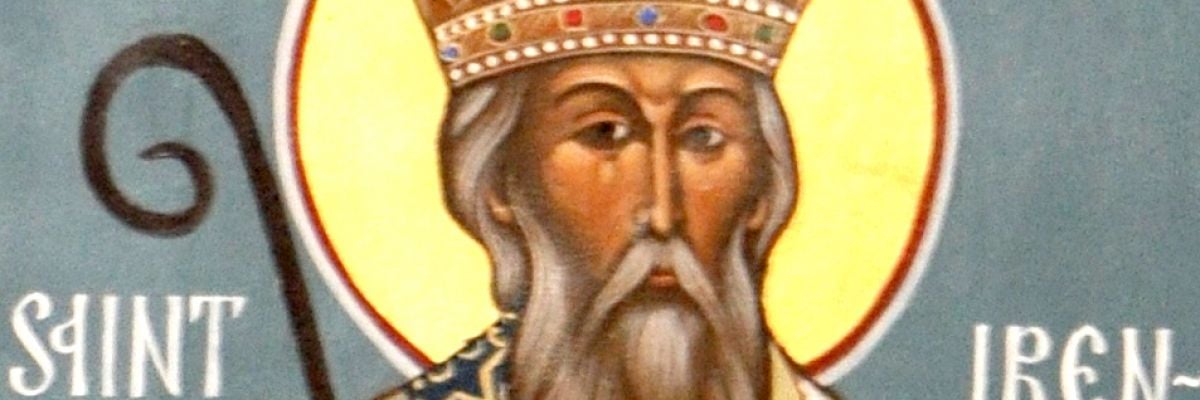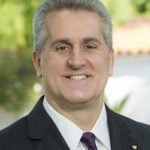
The early Church Fathers are indispensable resources for Catholic apologetics, helping to bridge the gap between our own time and the age of the apostles. Not only do they provide extrabiblical verification of the life and teachings of Jesus Christ, they also provide a great deal of insight into what the early Christians believed and how they interpreted Scripture.
This can go a long way to demonstrate that certain Catholic distinctives have been believed from the very beginning. Today is the feast day of one Church Father (and Doctor) I find to be particularly helpful in apologetics: St. Irenaeus.
Irenaeus was born around 125 at Smyrna in Asia Minor (modern-day Turkey). He was the bishop of Lugdunum in Gaul. Both Catholics and the Eastern Orthodox recognize him as a saint. His best-known work is Against Heresies, in which he refutes the teachings of the Gnostics. Much of his work is focused on theology, and because of this, it is an excellent resource to demonstrate how Catholic beliefs can be traced back to the early Church. Here are four examples.
1. On the Holy Trinity
Some quasi-Christian sects like the Mormons and Jehovah’s Witnesses deny the doctrine of the Trinity. However, this teaching is confirmed not only in the earliest creeds of the Church, but also in the writings of the earliest Christians. Irenaeus writes:
For the Church, although dispersed throughout the whole world even to the ends of the earth, has received from the apostles and from their disciples the faith in one God, Father Almighty, the creator of heaven and earth and sea and all that is in them; and in one Jesus Christ, the Son of God, who became flesh for our salvation; and in the Holy Spirit, who announced through the prophets the dispensations and the comings, and the birth from a Virgin, and the passion, and the resurrection from the dead, and the bodily ascension into heaven of the beloved Christ Jesus our Lord, and his coming from heaven in the glory of the Father to reestablish all things; and the raising up again of all flesh of all humanity, in order that to Jesus Christ our Lord and God and Savior and King, in accord with the approval of the invisible Father, every knee shall bend of those in heaven and on earth and under the earth (Against Heresies, 1:10:1).
2. On the authority of the Catholic Church
The bishops of the Catholic Church are the successors of the original apostles chosen by Jesus Christ. Irenaeus explains,
It is possible, then, for everyone in every church, who may wish to know the truth, to contemplate the tradition of the apostles which has been made known to us throughout the whole world. And we are in a position to enumerate those who were instituted bishops by the apostles and their successors down to our own times, men who neither knew nor taught anything like what these heretics rave about (Against Heresies, 3:3:1).
The Catholic Church also teaches that Jesus bestowed upon St. Peter a special place among the apostles as leader of the Church, making him the first pope (Matt. 16:18). Irenaeus explains that this was the Tradition of the Church in his day:
But since it would be too long to enumerate in such a volume as this the successions of all the churches, we shall confound all those who, in whatever manner, whether through self-satisfaction or vainglory, or through blindness and wicked opinion, assemble other than where it is proper, by pointing out here the successions of the bishops of the greatest and most ancient church known to all, founded and organized at Rome by the two most glorious apostles, Peter and Paul—that church which has the tradition and the faith with which comes down to us after having been announced to men by the apostles. For with this Church, because of its superior origin, all churches must agree, that is, all the faithful in the whole world. And it is in her that the faithful everywhere have maintained the apostolic tradition (Against Heresies, 3:3:2).
3. On the Real Presence of Jesus in the Eucharist
The Catholic Church teaches that Jesus is literally present—body, blood, soul, and divinity—in the Eucharist. That even the earliest Christians taught this is reaffirmed in the writings of Iranaeus:
He has declared the cup, a part of creation, to be his own blood, from which he causes our blood to flow; and the bread, a part of creation, he has established as his own body, from which he gives increase unto our bodies. When, therefore, the mixed cup [wine and water] and the baked bread receives the Word of God and becomes the Eucharist, the body of Christ, and from these the substance of our flesh is increased and supported, how can they say that the flesh is not capable of receiving the gift of God, which is eternal life—flesh which is nourished by the body and blood of the Lord, and is in fact a member of him? (Against Heresies, 5:2).
4. On Mary, the Mother of God
Mary is Jesus’ mother, and Jesus is God, so Catholics refer to Mary as the “Mother of God.” Many Fundamentalist Christians claim that the Virgin Mary did not carry God in her womb. Instead, they claim, Mary carried only Jesus’ human nature. But this is not what the early Christians believed. Irenaeus writes, “The Virgin Mary, being obedient to his word, received from an angel the glad tidings that she would bear God” (Against Heresies, 5:19:1).
We carry two resources at the Catholic Answers online shop that are very helpful for learning more about the early Church Fathers. The first is from our senior apologist, Jimmy Akin, titled The Fathers Know Best: Your Essential Guide to the Teachings of the Early Church. The second is a great introduction to the Church Fathers titled Handed Down: The Catholic Faith of the Early Christians by James L. Papandrea. Both of these are must-haves for anyone interested in becoming a better defender of the Catholic faith.



